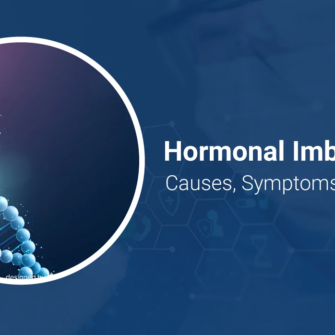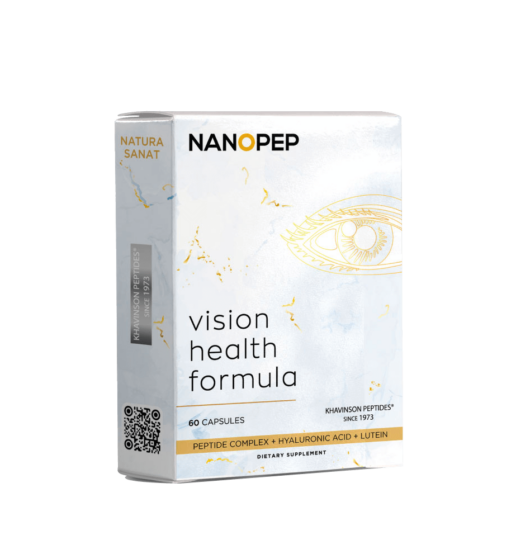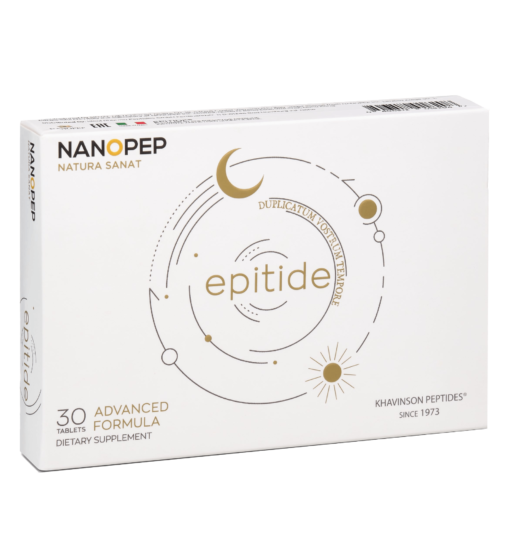
Peptides For Eyesight: Fight Macular Degeneration
The era of technology poses yet another challenge for public health ‒ this time, it’s all about screen time and its impact on macular degeneration in older people. While age-related visual decline is not news, science keeps on bringing new treatment options, providing patients with better results.
Battling eye health challenges
 Age-related macular degeneration is a common eye condition that primarily affects people over 50. This condition manifests when the macula (central part of the retina) changes its structure or vascularization. Therefore, there are two types of AMD:
Age-related macular degeneration is a common eye condition that primarily affects people over 50. This condition manifests when the macula (central part of the retina) changes its structure or vascularization. Therefore, there are two types of AMD:
- dry ‒ caused by macular thinning;
- wet ‒ caused by rapid vascularization under the retina.
As people age, the density and functionality of photoreceptor cells in the retina, particularly in the macula, decrease. This loss of photoreceptors leads to a reduction in visual acuity and contrast sensitivity
Common treatments for degenerative retinal disease have several limitations and challenges, making them less than ideal for many patients.
For example, treatments like anti-VEGF don’t work for all patients. Anti-VEGF treatments require frequent intravitreal injections directly into the eye, often monthly. This procedure is invasive, uncomfortable, and carries associated risks.
Degenerative retinal diseases are often multifactorial and complex, which makes it difficult to develop one-size-fits-all treatments that are universally effective.
These challenges highlight the need for ongoing research and development of new, more effective treatments for degenerative retinal diseases ‒ preferably, targeted therapy.
The key to stopping macular degeneration
 Stopping abnormal blood vessel growth is key to improvement in degenerative retinal diseases like AMD because these vessels cause significant damage to the retina. They are fragile and prone to leaking blood and fluid, leading to swelling, bleeding, and scarring of the retina. This leakage disrupts the normal retinal architecture and impairs its function, causing rapid vision loss.
Stopping abnormal blood vessel growth is key to improvement in degenerative retinal diseases like AMD because these vessels cause significant damage to the retina. They are fragile and prone to leaking blood and fluid, leading to swelling, bleeding, and scarring of the retina. This leakage disrupts the normal retinal architecture and impairs its function, causing rapid vision loss.
Vascular endothelial growth factor is a protein that plays a critical role in the formation of new blood vessels. While VEGF is important for normal bodily functions like wound healing and the formation of blood vessels during development, its overexpression in the eye leads to pathological conditions. Therefore, anti-VEGF therapies work by inhibiting VEGF activity and reducing the growth of blood vessels behind the retina.
This kind of therapy is not for everyone, though. Another option to specifically inhibit retinal VEGF is peptide therapy.
Peptide therapy for eyes
Retinal health peptides hold significant promise for treating age-related macular degeneration due to their ability to target and modulate specific biological processes at the cellular level. These peptides work by mimicking or influencing the body’s natural regulatory processes, promoting repair, regeneration, and normalization of cellular functions ‒ directly where you need them to be.
 One of the key benefits of using peptide bioregulators for AMD is their specificity. Peptides can be designed to interact with particular receptors or cellular pathways involved in retinal health. For instance, peptides that inhibit angiogenesis can be particularly effective due to their ability to naturally suppress VEGF.
One of the key benefits of using peptide bioregulators for AMD is their specificity. Peptides can be designed to interact with particular receptors or cellular pathways involved in retinal health. For instance, peptides that inhibit angiogenesis can be particularly effective due to their ability to naturally suppress VEGF.
Peptide treatment for eyes offers several benefits:
- As naturally occurring molecules, peptides are generally well-tolerated by the body, reducing the risk of adverse reactions and side effects. This biocompatibility makes them a safer option for long-term use compared to some synthetic drugs.
- Peptides are designed to target specific cellular functions and pathways, allowing for more precise interventions in the disease process.
- Peptides enhance cellular functions by promoting better nutrient uptake, waste removal, and overall cellular metabolism. This also improves the resilience and functionality of retinal cells, helping to maintain vision.
While peptide bioregulators hold great promise for improving AMD, they are still a relatively new area of research. However, the early research study results are promising, and these peptides could become an important part of a comprehensive treatment strategy for AMD, potentially used alongside other therapies to maximize patient outcomes.

Thyroid Disease: What It Is, Causes, Symptoms & Treatment
Read
Hormonal Imbalance: Causes, Symptoms & Treatment
Read
Unleash your healing power with peptides: how to use the magic of peptides for optimal health
Read
What are good peptides for menopause?
Read
How do Ultra Short Peptides from Prof. Khavinson work
Read
Why are Bioregulators are so Important for your health
Read


